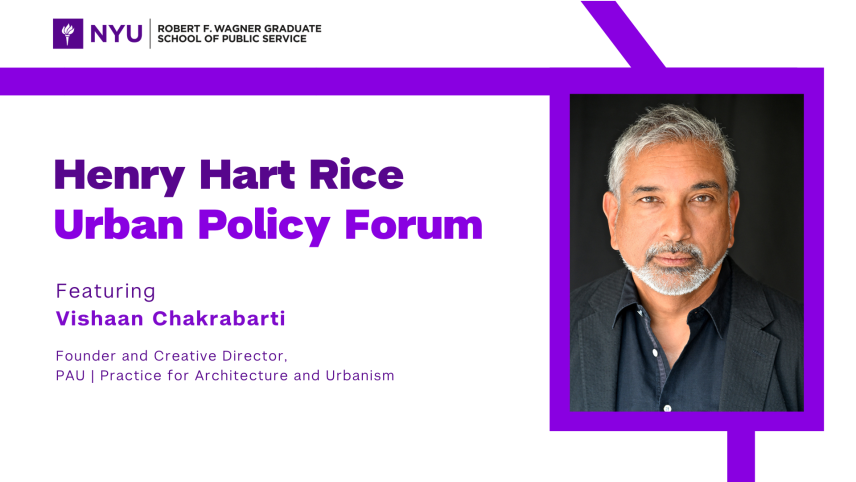Henry Hart Rice Annual Urban Policy Forum
Join the NYU Wagner community for the Henry Hart Rice Urban Policy Forum, an annual engagement in which public service leaders examine the most critical issues in policy and city planning. This year, we are pleased to welcome Vishaan Chakrabarti as our speaker. Vishaan is one of the leading urban thinkers in the world today, and his talk will draw upon the ideas and issues explored in his new book.
THIS EVENT IS SOLD OUT. REGISTRATION IS REQUIRED.
FEATURING:
Vishaan Chakrabarti is an architect, author, and public thought leader. He is the founder of PAU | Practice for Architecture and Urbanism, a Manhattan-based architecture firm dedicated to building ecological, equitable and joyous communities. As a licensed practitioner across several states, Chakrabarti leads the studio’s cultural, institutional and infrastructure work including Brooklyn's Domino Sugar Refinery, Cleveland's Rock and Roll Hall of Fame, Princeton's Hobson College, and New York's Pennsylvania Station. His past positions include working as a principal in other global architecture firms, teaching at Columbia University, and serving as the William Wurster Dean at UC Berkeley’s college of architecture. As Mayor Michael Bloomberg’s director of planning for Manhattan in the aftermath of 9/11, Chakrabarti helped to reimagine the High Line, rebuild the World Trade Center, extend the #7 subway line, and revitalize the waterfront.
In addition to his role at PAU and serving on numerous non-profit boards, Chakrabarti currently teaches at Cornell University as the Thomas J. Baird Visiting Critic in Architecture, and is a regular contributor to the New York Times, Vital City, and other publications. He is the author of two books: A Country of Cities: A Manifesto for an Urban America (Metropolis Books, 2013), and most recently, The Architecture of Urbanity: Designing for Nature, Culture, and Joy (Princeton University Press, September 2024) in which he argues that designing connected physical communities that bridge our differences—as opposed to disconnected technologies that exacerbate them—is essential to addressing our greatest societal challenges from climate change to political division to our growing public health crises.
